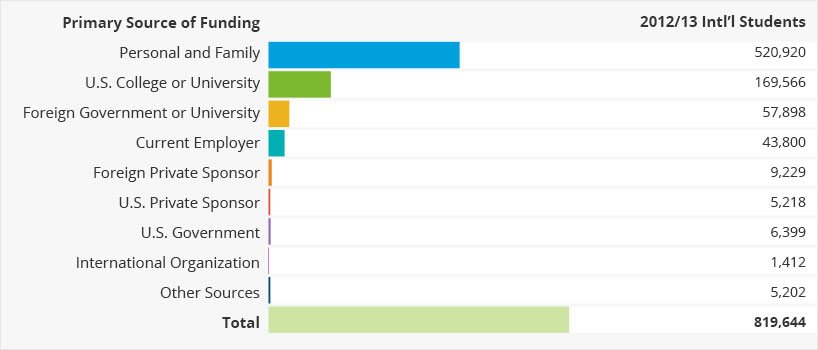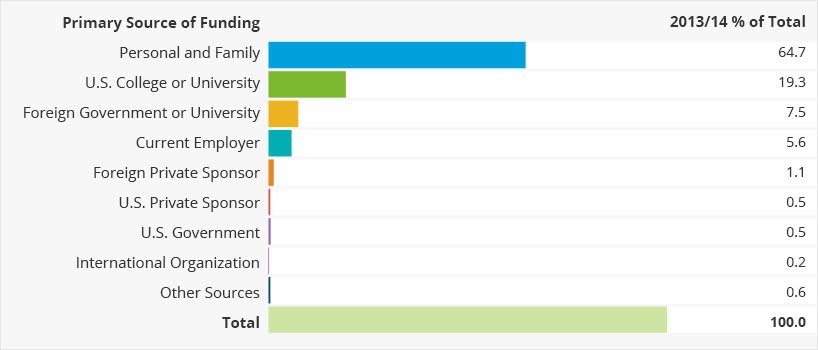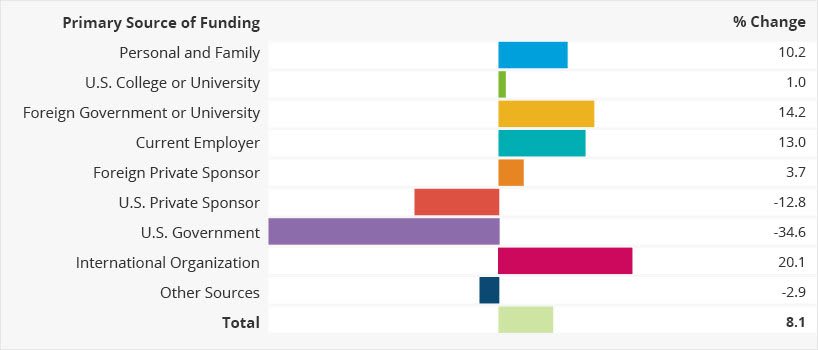Campus Resources, Financial Aid Options and Expert Advice to Prepare You to Study in the States
International students reap many educational – and personal – benefits when they attend college in the United States, but there's much to learn prior to embarking on their journeys to make sure they get the most from their time abroad. This guide will inform students about how to best utilize on-campus resources to help maximize their time in America, and includes information such as financial aid options, what students can expect on an American campus, and how to overcome the most common challenges international students face.
Fast Facts on the International Student
- In the 2013-2014 academic year, there were almost 900,000 international students in the United States.
- Since 2000, the enrollment of international students in colleges around the country has increased 72 percent.
- Students from China, India, and South Korea represent 50 percent of international students in the United States.
- International students brought $27 billion into the country's economy in 2013.
- In recent years the numbers of international students from Brazil, Kuwait, Iran, and Venezuela have significantly increased.
- Fifty-six percent of international students in the United States are male.
- The states with the most international students are California, New York, and Texas.
Sources: SEVIS by the Numbers. U.S. Dept. of Immigration & Customs Enforcement (2014, July 1)
Record 900,000 international students in US: The top countries they hail from. The Christian Science Monitor (2014, November 17)
The Geography of Foreign Students in U.S. Higher Education: Origins and Destinations. Brookings (2014, August 29)
On-Campus Resources for the International Student
Students have many needs when they go to college, and schools have numerous resources available that can help them navigate their way through different types of challenges. These services can be particularly helpful to the international student, who is not only adjusting to college, but a new country. Many schools offer the following, making the campus a wealth of resources for the international student.
Legal services center
Although students who have questions about their immigration can get answers through the multicultural affairs office, when other legal issues come up – like what to do about a speeding ticket – a college's legal services center can help.
Language courses and writing centers
Understanding language is a common challenge for international students, which can add to the stress of living in a new country and acclimating to the culture. In addition to taking advantage of the resources available at the multicultural affairs office, one important resource that students have is to take English as a Second Language courses that allow them to work on their writing and speaking skills. Also, many schools have writing centers that allow students to get the extra attention they need with writing in English.
Fitness center
Staying healthy can go a long way toward being successful in school and alleviating the stress of being so far away from home. Colleges and universities tend to have fitness centers that are much like a local gym, equipped with different kinds of fitness equipment and either offered to students at low to no cost.
Medical center
All students get sick from time to time, or may have an accident. Campuses typically have their own medical centers that students can visit to receive different types of care. Student fees go toward this service, so they don't have to worry about paying for treatments or having medical insurance before visiting.
Career services center
Many students want to find a job to help pay their expenses or gain experience that will help them in their career. This can be especially challenging for international students, who have restrictions on where they can work with their student visas. The career services center can help these students understand what types of opportunities are available to them, as well as help them find appropriate job openings.
Counseling center
Students who are overwhelmed during their transition into a new culture may feel intense sadness or anxiety from time to time. The counseling center is a place where international students can discuss their concerns about classes, friendships, family, romantic relationships, or any other issues that may arise.
Ombudsman
This office can help students resolve conflicts and make complaints when they have been the victim of discrimination, sexual harassment, or other forms of unfair treatment.
AffordableCollegesOnline.org is an advertising-supported site. Featured or trusted partner programs and all school search, finder, or match results are for schools that compensate us. This compensation does not influence our school rankings, resource guides, or other editorially-independent information published on this site.
Featured Online Programs
Find a program that meets your affordability, flexibility, and education needs through an accredited, online school.
Program Options for the International Student
Choosing a degree program is a challenging decision for any student to make, but it is especially difficult for those leaving their homeland to study in the United States. However, international students can find clues to what degree programs are viable options by looking to what others in their situations are pursuing. According to the Brookings Institution, the most popular degree programs among foreign students are in STEM (science, technology, engineering and mathematics) disciplines. Conversely, many students who come to the U.S. also gravitate toward business degrees, with specialties in business administration, marketing or management.
Fast Fact: There were 886,052 international students attending U.S. colleges and universities in 2013-14 – a new enrollment record.
Source: The International Student Economic Value Tool. NAFSA (2014)
That's not to say that international students only undertake STEM or business courses. Many enroll in social science, humanities, education, fine art, health and education degree programs. Below, four degree options available to international students – and other considerations, such as best location to undertake the program – are outlined.
Biology
Students who are interested in earning a biology degree have a wealth of options, so they should consider what they want in a program and a school when making their choice. For students who are interested in a broad educational experience that includes a wide range of coursework, specialized concentrations, and opportunities to participate in research projects, a large school is likely the best option. On the other hand, smaller schools are a good choice for students who want more intimate attention, smaller class sizes and increased interaction with their professors.
Communications
There are many choices for students who want to pursue a communications degree, although not all schools focus on the same things. Students should decide on a sub-discipline, like public relations, journalism, or advertising, and find a school that specializes there. Students will also benefit from getting hands-on experience when they earn these degrees, and may want to consider going to school in a larger city that has more media companies and opportunities for internships.
Fine Arts
Although these degree programs can be found at large and small schools alike, schools in larger cities may be a better option when choosing a fine arts degree. Students in cities benefit from immersing themselves into a diverse artistic culture, and bigger cities give students more opportunities to visit museums and art galleries to supplement their classroom learning.
Psychology
The U.S. leads the way in psychological research, so it's not uncommon for international students to come here to earn their psychology degree. With research in mind, students may prefer to attend a big school, as these institutions generally have larger research budgets and more opportunities to participate in studies.
The United States Classroom
Just as international students can expect significant differences in life outside of the classroom, there are also things about the way courses are run in the U.S. that may be a bit surprising. Primarily, professors at American institutions tend to be more learner-centered, meaning they encourage students to participate in their classes by asking questions and even to challenge what the professor says. In many other cultures, there is a more teacher-centered approach to learning, so in those classrooms, students are expected to receive information from the professor without interaction.
As a result of this difference, many international students are surprised to find that professors in the U.S. encourage, and even expect, students to participate in classroom discussions and ask questions. Professors are also typically more accessible than what some international students are accustomed to, and they may be happy to learn they can visit their professors during office hours, or email them with questions and concerns about a course.
Students also have greater responsibilities than they may have in their native country. At American institutions, students are expected to come to class on time and stay until the end, let their teachers know if they're going to be absent, and take responsibility for their own learning.
International Programs: Benefits Beyond Borders
International students reap several benefits when they choose to study in the United States. First and foremost, the country is home to many of the world's most prestigious colleges and universities, giving students a quality education that they may not have access to in their home country. These schools give students the opportunity to participate in academic research and training programs, as well as use state-of-the-art technologies that can enhance their educational experience.
By the Numbers:Who Sends the Most Students to Study in the U.S.?

Similarly, when students come to America to earn a degree, they benefit from what's going on outside of the classroom. Whether they decide to study at a small college or a large university, the access to many rich, cultural experiences can appeal to a wide range of interests.
Fast Fact: International students contributed $27 billion to the economy in 2013.
Source: NAFSA (2014)
At the national level, international students can help build and foster the U.S.'s relationships with other countries – particularly when future business leaders take what they learned to work at jobs in multinational corporations. International students also add to the culture and diversity of American colleges and universities. According to the Journal of International Students, when American students interact with their peers from other countries, not only do they learn different languages and cultures, they increase their creativity and understanding of the relationship between technology and society.
Global Perspective:Interview with an International Student
Priyanki Brahma is originally from India, and is currently enrolled with the School of Professional Studies at New York University. Below, she discusses her experiences as an international student.
What are you studying?
I am currently in my second year of an MS in Public Relations and Corporate Communications.
What made you choose a school in the United States?
I was a journalist back in India and wanted to make a career change and get into public relations. But before that, I wanted to acquire the academic knowledge in the subject. NYU has one of the best graduate programs in PR and communications in the world, which made the choice easy.
What challenges have you faced in coming to the United States to study?
I'd say I have been very lucky. I had a few friends from India already at the university finishing their graduate studies, so they helped me with initially settling in. NYU and its international student affairs office have been very supportive. The one challenge I faced was managing my finances. New York City can be very expensive.
How have you been able to overcome those challenges?
I started working on campus to help myself with living expenses.
What advice would you give to international students to make their transition easier?
Make local friends and keep seeking help from your university/college's student center. They are the biggest resources of help.
What mistakes have you seen international students make and how can they be avoided?
Many international students tend to be introverts by nature and try to keep things to themselves, thinking their local friends or others will mock them because of their habits. This also gets in the way of participating in competitions or events where they might have to face a crowd. Shedding the shy nature will open up so many doors for them to pursue and promote their creative talents.
Scholarships and Aid for International Students
Unfortunately, there are not many avenues for international students to receive financial aid. The majority of these students – roughly 65 percent – actually pay for their own education through personal and family funds. However, there are funding opportunities out there for students who need assistance with financing their international studies.
Financing an International Education
International Students by Primary Source of Funding, 2012/13 – 2013/14




Government funding
Since many countries encourage their citizens to earn degrees in the United States, there may be opportunities for international students to receive funding from their home country. Students may be able to apply for international student loans from the U.S. government, such as the Stafford Loan and PLUS Loan. In order to find out more information about these opportunities, students should check their country's official website as well as the U.S. Embassy in their homeland.
International organizations
Students may be able to receive college funding from a number of international organizations. Among them are the Fulbright Commission, the United Nations, the World Health Organization, and the World Council of Churches.
Colleges and universities
Many colleges and universities in the U.S. offer funding for international students in order to promote diversity within their institutions. Funding may be based on need or academic achievement, depending on the school. Some schools offer scholarships based on artistic or athletic ability. Students should inquire with the financial aid office at the schools they're considering to find out what funding is available to foreign students.
When applying to schools, prospective students should keep in mind that institutions often charge different rates for those who come from other countries. Some schools charge a higher tuition rate for international students, as well as additional fees, such as administrative, health or academic services fees. Students should always speak with admissions officials regarding any additional fees they may be subjected to prior to application.
Key Resources for Financing International Studies
Securing financial aid for international students can be difficult, but there are many organizations and places offering information and assistance. Some aid comes in the form of a grant, which does not have to be paid back. Other aid may be in the form of a loan, which usually carries a low interest rate and must be paid back after the student finishes the program. There are scholarships available for specific countries and specific courses of study, as well as more general financial offers. Keep this in mind when searching for help. While it may be a challenge to finance an international education, it's not impossible. Here are some places to start:
General Financial Aid Resources
Financial Aid for International Students
- AIFS Study Abroad Scholarships
- CIMO Scholarship Programs (Finland)
- International Student: Financing Options
- U.S. News Education: What Financial Aid is Available for International Students?
- Abroadplanet
Loans for Intl Students
- IEFA (International Financial Aid and College Scholarship Search)
- International Student Loan
- Study Abroad Loans
- Interest Free Loans- Rowe Fund
Scholarships for Intl Students
- IREX International Research Exchange Board)
- International Peace Scholarship
- SEG Foundation Scholarship Program
- AIFS Study Abroad Scholarships
- Council for International Exchange of Scholars (CIES): Fullbright Scholarships
- International Scholarships
- The Scholarship Coach
- Mobility International USA
- UNESCO Guide to Study Opportunities and Scholarships
- AAUW Educational Foundation
- Research Grants and Graduate Student Exchange Fellowships
- The Margaret McNamara Memorial Fund
- OAS (Organization of American States)
Life on the American Campus
While academics are a vital part of the international student's experience, what goes on outside of the classroom is also important. Understanding the day-to-day details of student life on American campuses can help foreign students adjust to being so far away from home. Success depends on the details, and a careful plan will go a long way to ensure the smoothest transition possible.
Living Arrangements
Many students at American colleges and universities choose to live in dormitories on campus. With these accommodations, students generally share a room and common bathroom with two or three other students of the same gender. Students who live in dorms usually eat at the on-campus cafeterias, which allow students to prepay for meals via a meal plan program.
Don't Forget: Be sure to check the U.S. Customs and Border protection's website before you pack for a comprehensive list of what you can, and can't, bring into the country.
Other students, particularly those who have already lived on campus for a few years, elect to live off campus by renting apartments alone or with some roommates. Generally requiring a lease agreement, students will also be responsible for utilities such as power, gas and internet, as well as regular grocery shopping. Students may consider buying renter's insurance, which is designed to help them replace belongings that are stolen or destroyed in a fire.
A Home Away From Home
Although coming to the United States to attend college is a rewarding experience for international students, it can also be stressful as they navigate their way through a foreign culture. In fact, in many cases the stress of being in a new country can cause culture shock – the severe feeling of frustration associated with adjusting to a way of life that is drastically different from their own.
Despite these challenges, there are ways that international students can feel more at home in America, allowing them to enjoy their time here and thrive both academically and socially.
Care packages
Receiving packages that remind international students of home are an effective way for them to stay connected to their family and friends, as well as the things they love about their culture. Items like pictures of the people they care about, or their favorite music, food, movies and clothing from their homeland can help international students alleviate stress as they adapt to new surroundings.
Finding a homestay family
International students who do not want to live on campus or rent their own apartment may consider a homestay arrangement, where they live with a host family in the community. This way, students get an off-campus experience but don't have to worry about paying for rent, utilities and meals. This can ease loneliness, and makes the transition into American life easier, as families can teach students about getting around the area, places to go to have fun, and how to deal with different cultural issues.
Balancing Studies and Social Life
It's easy for any college student to get so overloaded with work that they forget to have fun. This can make life especially hard for international students, who may become homesick if they aren't balancing enjoyable activities with their studies. Participating in social events on and off campus, visiting museums, or going to the movies or concerts can help international students get away from schoolwork for a while and associate fun activities with their new home. Other sources of activities include:
School multicultural programs
Many colleges have a multicultural affairs office, which is a great way for international students to connect with others in the same position, and often people from the same country of origin. These departments can be an invaluable resource for students, as they often organize social events and seminars that help give students a sense of belonging. Some colleges have clubs for people of a specific ethnicity that students can join to feel further connected with their peers.
Volunteer work
Volunteering for a cause that is important to them can allow international students help those who are less fortunate while simultaneously meeting new people and further immersing themselves into American life. This can also be a great way to get to know the city where they live and explore it in ways they couldn't were they restricted to campus.
Extracurricular activities
Extracurricular activities allows the international student to make friends at their school, learn more about the culture and gain important skills like leadership and time management. The activities that can be found at colleges and universities include sororities and fraternities, athletic teams, bands and orchestras, public speaking groups, school newspapers and radio stations, honor societies, and clubs related to specific interests like business or gardening.
Tools to Stay in Touch
Although picking up the phone to call home is ideal, it is often too expensive, or the time differences make it too challenging to connect with people in another country. However, that doesn't mean international students can't regularly keep in touch with their loved ones. Things like Skype, email, social networking sites and even snail mail can help students have regular contact with their friends and family at home. When students do prefer to call, prepaid phone cards can help to keep costs down.
Beyond Campus: Handling the Daily Details
Though fairly mundane, the small details of day-to-day life in the U.S. can seem overwhelming when first experienced by an international student. Keep these tips in mind to help make daily life easier.
Bank accounts
Students can open a bank account with their passports and another form of photo identification, like their student ID card, and make their first deposit with traveler's checks or a wire transfer from their bank at home. Different banks have different rules concerning things like required minimum balances and the fees they charge for services, so it's best to find out this information before opening an account.
Jobs
International students must have an F-1 visa in order to work in the United States. Students may be able to get a job on or off campus, but they are required to work under the restrictions of their visa. For more information about these rules, students can speak to the multicultural affairs office on their campus.
Transportation
Depending on where they go to school, international students generally have several transportation choices. Larger cities usually have more options of buses, trains and subways for students to choose from, but smaller cities will have some form of public transportation too. In many areas, people choose to ride bicycles in order to get around their city – an inexpensive and healthy alternative to driving.
Safety
Safety on and off campus is always a concern for college students, but there are ways they can protect themselves and their belongings. Students should always keep an eye on their valuables whether they are on or off campus, and take precautions like installing a locking device on their laptop, and keep the doors and windows of their dorm rooms locked at all times. Students must maintain constant vigilance regarding their surroundings, especially after dark. It's smart to employ the buddy system when out after dark, or to use the campus escort service. Students should know where the emergency phones are on campus, and where their campus security office is located.
Keep up with the latest
Never miss a detail on the news, trends, and policies that could directly impact your educational path.
Best Master's in Data Analytics Programs: What You Need to Know
Top Online MBAs in Business Analytics
Explore the top online MBAs in business analytics, including tuition costs, curricular offerings, and more with this student research resource.
Scholarships and Financial Aid in Texas
Financial aid makes college a reality for many students. Learn about the top scholarships in Texas and how you can earn one.
AffordableCollegesOnline.org is an advertising-supported site. Featured or trusted partner programs and all school search, finder, or match results are for schools that compensate us. This compensation does not influence our school rankings, resource guides, or other editorially-independent information published on this site.
Do this for you
Explore your possibilities- find schools with programs you’re interested in and clear a path for your future.